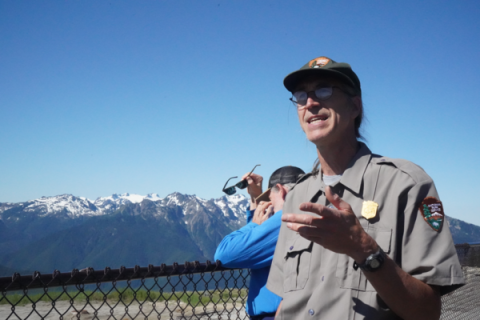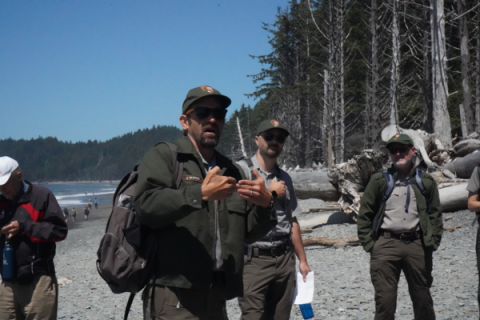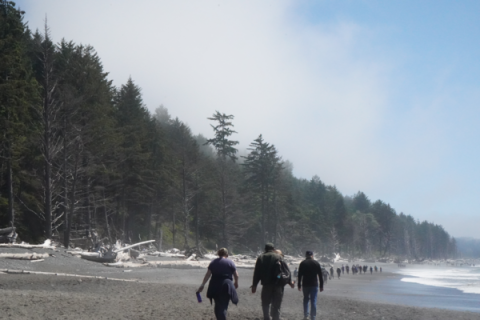Catching Up With Quigley: Week of July 15
Dear Friend,
I hope you have had a good week. This week, I led my ninth climate change tour by visiting Olympic National Park in Washington.
Over the years, I have led these visits to raise awareness around the threat of climate change and to take important lessons back to Congress that will inform my work to protect our national treasures for generations to come. I have visited Rocky Mountain National Park, Everglades National Park, Indiana Dunes National Park, Yellowstone National Park, Shenandoah National Park, Acadia National Park, Yosemite National Park, and Denali National Park.
Few trips have been more eye opening than this week's tour of Olympic National Park. I wanted to take a moment to share some of the important findings I learned during my visit.
1. Melting Glaciers

On the first day we traveled up to Hurricane Ridge -- named after the hurricane-like winds that sweep across the ridge. From here, you can see breathtaking views of the isolated and less-accessible interior of the Olympic Mountains, specifically the park's iconic glaciers. We heard from the park's climate ecologist about how warming temperatures are impacting these glaciers. To put it into perspective, in 1982 the park had 266 glaciers; in 2009 there were 184. The ice is an essential resource for creatures from tiny ice worms found only on glacial ice, to steelhead and salmon returning up snow and ice-fed rivers, and even to humans living downstream or climbing to the icy heights. An alarming report from 2022 found that all of Olympic’s glaciers could be gone by 2070. Congress must address climate change and ensure these icons of the Pacific Northwest summits persist.
2. Coastal Erosion

On the second day, we traveled to Rialto Beach to hear from a marine biologist about how climate change is impacting the Olympic Peninsula. Over the years a combination of King Tides, strong winter storms, and freeze-thaw events have led to a significant erosion of the bluff. The bluff’s loose composition of sand, gravel, and stone makes it especially vulnerable to erosion from wave action enhanced by soaking rains and recent freeze-thaw events. The saturated material expands when frozen and becomes weaker when it thaws. Bluff erosion is a natural process that has accelerated over the last ten years as extreme weather events have become more frequent. In March, the park was forced to remove structurally compromised cabins in Kalaloch, Washington that stood within five meters of the bluff edge and were therefore unsafe for occupancy.
3. Ocean Acidification and Warming

Another alarming change that scientists have witnessed is an extreme rise in ocean temperatures. In fact, they have recorded a 0.75 degree Celsius warming per decade. This increase in temperature is detrimental to the organisms the call the ocean home. In fact, warming seas fueled by climate change has exacerbated Sea Star Wasting Syndrome, which causes sea stars to dissolve. It's gotten so bad that their populations are just a fraction of what they used to be.
Another concerning consequence of climate change is ocean acidification. The ocean absorbs about 30% of the carbon dioxide (CO2) that is released in the atmosphere. As levels of atmospheric CO2 increase from human activity such as burning fossil fuels and changing land use the amount of carbon dioxide absorbed by the ocean also increases. This process has an especially devastating effect on shell organisms. Ocean acidification prevents calcium carbonate from being used to create shells and takes the calcium carbonate from the organisms that are alive.
While this tour was deeply enlightening, it reinforced just how pressing the threat of climate change truly is. It is incumbent upon members of Congress to advance legislation that will reduce our reliance on fossil fuels, provide our parks the resources necessary to adapt to these changes and ultimately avoid further damage to our planet. If we don’t act, generations of Americans after us will be left wondering why we failed them and why we failed to protect our national treasures from climate change.
Don't forget, our office is always here to help.
You can call my DC office at (202) 225-4061 or my Chicago office at (773) 267-5926. You can also email me through my website at Quigley.house.gov/contact.
Sincerely,
Mike Quigley